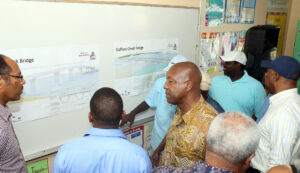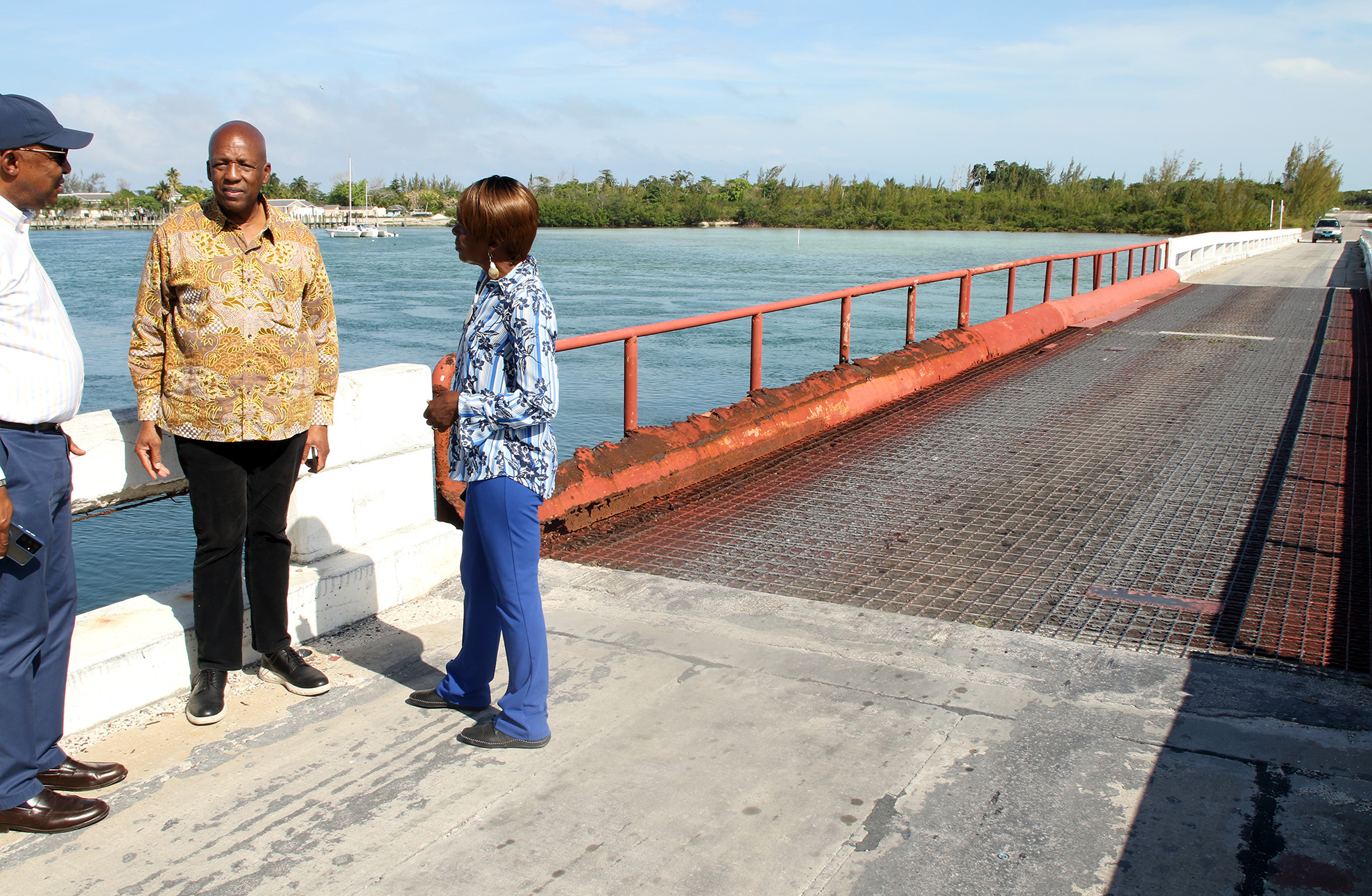By KATHRYN CAMPBELL
Bahamas Information Services
#ANDROS, The Bahamas, April 17, 2023 – Andros residents viewed new design concepts and voiced their concerns about the two 50-year-old bridges in Fresh Creek and Stafford Creek during a Town Hall Meeting hosted by the Ministry of Works and Utilities.
“The reason why we’re here is not to engage in an academic exercise, but the people of Andros should inform this

process. You live here, you own the creeks, you fish on the creeks, and you’re the ones who will have to protect the creeks,” the Hon. Alfred Sears, Minister of Works and Utilities said, stating that work must be done in these times of challenging climate change to improve resilience and protect life, safety, and property of the people of Andros.
The minister said: “In fact, Andros will be the symbol of what a small island nation state can do in terms of resilience, sustainability; and the infrastructure that we will present to you this afternoon reflects those concepts — we are asking for your wisdom to guide the designers with your contributions, recommendations and observations.”
Minister Sears led a delegation Thursday, April 13, 2023 to the island to present options for the bridges. Among the delegation: Bacchus Rolle, Parliamentary Secretary; Leon Lundy, Parliamentary Secretary and MP for Mangrove Cay and South Andros; Luther Smith, Permanent Secretary; Basil Longley, chairman, The Bridge Authority; Robert Mouzas, deputy director; David Cox, senior civil engineer; Jumanne Paul, senior engineer; Kevin Sweeting, project lead; and representatives of BRON Ltd.
Also in attendance at the meeting held at Central Andros High School was Beverly Larrimore, administrator for North Andros; and heads of Government departments.
Said Mr. Sears, “As you will see in the presentation, the bridge represents a road and it is a vital road because in Central Andros we have three critical creeks and if there were no bridge over those creeks, there would be no road and thus separation. Andros is mighty because it is connected — north, central and south — it is what we call the Big

Yard. It’s not one piece of Andros; it’s all of Andros. What keeps Andros unified are those roads and over the water — the bridges.”
Mr. Mouzas informed that BRON was engaged in 2020 to undertake a feasibility study of both bridge sites and offer the “best” solution for residents and visitors. A meeting was held with residents on August 14, 2020 to solicit feedback on the study.
“We have listened to your requests,” said Mr. Mouzas. “Today, BRON team will be presenting preferred solutions.”
Mr. Sweeting outlined requirements, concerns, options, concepts and solution developments for the bridges.
He said results of a survey revealed concerns of residents including the need for dual lanes, wider bridges to allow traffic access and increase of height and clearance.
Over 80 percent of concern was for safety.
Concern was also expressed for traffic accessing the Stafford Creek Bridge as it is on a curve.
Residents expressed a “strong” desire for a higher bridge for Fresh Creek – higher than the 12 feet proposed in the Ministry’s requirements — to allow vessels with a higher height to get under the bridge to travel to the western area of the creek and possibly spur economic development there.
The survey also indicated several environmental concerns, and that residents have no desire to pay a toll.
He explained that the single lane, 53-year-old bridge in Fresh Creek is in poor condition, allows one lane of traffic at

a time and currently designed for a weight of 10 tons which means that nothing heavier than 10 tons should cross the bridge. It has a 9ft. clearance, no sidewalks, utilities are vulnerable to impact and many of them are exposed.
He said the conditions of the bridge in Stafford Creek Bridge are similar to Fresh Creek Bridge with the exception of the alignment of the road to the entrance which has two curves on either side that makes access unsafe for vehicles.
Regarding the concept drawing of the preferred option for Fresh Creek Bridge Mr. Sweeting said, “We designed this option with a 36-ft. clearance from main high water considering sea level rise estimated at 1 metre. It is a reinforced concrete structure, very resilient, it’s meant for this type of environment that is highly corrosive, more than 7 feet between piers, there is little obstruction in the creek. With this option there will be a need for dredging. Because we are now raising the bridge we need to actually lengthen the bridge. We are now increasing the length of Fresh Creek Bridge in order to get a higher height we will have to do some dredging on the southern side of the bridge. We’re looking at about 7 feet of dredging at its maximum depth.”
Mr. Sweeting informed that the option for demolition of the existing bridge and construction of a new replacement 2-lane bridge has been selected for Stafford Creek Bridge.
“Government would have gone ahead with option 3 based on recommendations of locals who said a new bridge was desired. We would have looked at a bridge at a relocated location. Moving it further west allows it now to have a safer alignment approaching the bridge – will allow it to have a wider curve approaching the bridge that is safer than the curve that’s currently there. The existing bridge would remain and we would build a new bridge to the west of it — new bridge with 2 lanes and 2 private sidewalks on each side.”
Mr. Sweeting assured residents that the concepts for both new bridges would allow improved access and provide safety for users.

“The cost of recommended options is high but does provide additional safety and improved access to vehicles and boats. Even though the cost is high there is a high return value for the long term so the initial high cost can be justified because long term will provide safety and greater access to the bridges.
“We will improve infrastructure along Queen’s Highway. We will look at making improvements to utility infrastructure that crosses the bridge, and the roads that approach the bridge will be improved. They create more opportunities and economic activity west of the bridge as we open them up.”
A question and answer period followed the presentation. Concerns raised by residents included improvements to the creek near to Fresh Creek Bridge, opportunities for transferring knowledge, compensation to persons affected by work on the project and more.


 News1 week ago
News1 week ago
 Caribbean News1 week ago
Caribbean News1 week ago
 News1 week ago
News1 week ago
 News6 days ago
News6 days ago
 News6 days ago
News6 days ago
 News7 hours ago
News7 hours ago















